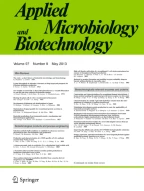Abstract.
The bioconversion of toluene into 3-methylcatechol was studied as a model system for the production of valuable 3-substituted catechols in general. For this purpose, an improved microbial system for the production of 3-methylcatechol was obtained. Pseudomonas putida strains containing the todC1C2BAD genes involved in the conversion of toluene into 3-methylcatechol were used as hosts for introducing extra copies of these genes by means of a novel integrative expression system. A construct was made containing an expression cassette with the todC1C2BAD genes cloned under the control of the inducible regulatory control region for naphthalene and phenanthrene degradation, nagR. Introducing this construct into wild-type P. putida F1, which degrades toluene via 3-methylcatechol, or into mutant P. putida F107, which accumulates 3-methylcatechol, yielded biocatalysts carrying multiple copies of the expression cassette. As a result, up to 14 mM (1.74 g l–1) of 3-methylcatechol was accumulated and the specific production rate reached a level of 105 µmol min–1 g–1cell dry weight, which is four times higher than other catechol production systems. It was shown that these properties were kept stable in the biocatalysts without the need for antibiotics in the production process. This is an important step for obtaining designer biocatalysts.
Similar content being viewed by others
Author information
Authors and Affiliations
Additional information
Received revision: 2 November 2000
Electronic Publication
Rights and permissions
About this article
Cite this article
Hüsken, .L., Beeftink, .R., de Bont, .J. et al. High-rate 3-methylcatechol production in Pseudomonas putida strains by means of a novel expression system. Appl Microbiol Biotechnol 55, 571–577 (2001). https://doi.org/10.1007/s002530000566
Received:
Accepted:
Issue Date:
DOI: https://doi.org/10.1007/s002530000566
